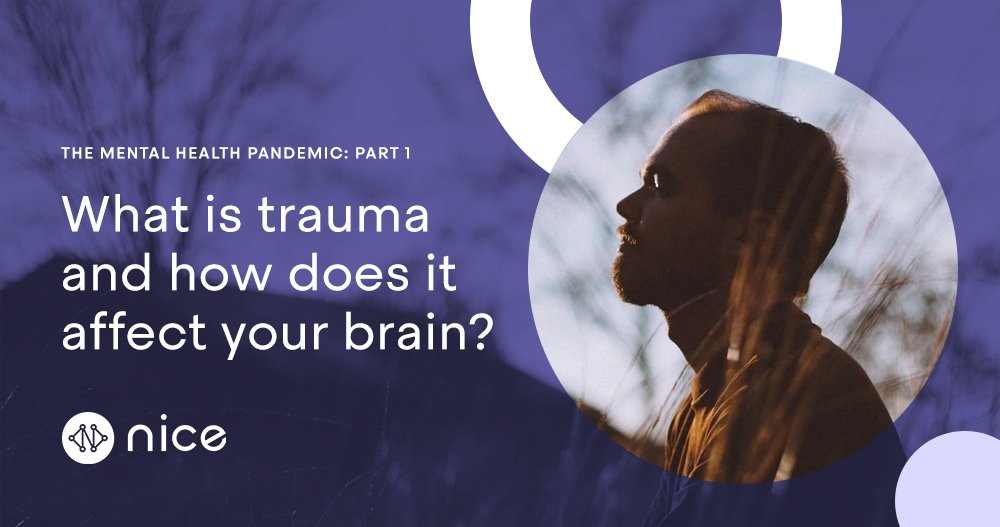What Is Trauma and How Does It Affect Your Brain?
It’s time to pull back the curtain on the shared and corporate trauma we have experienced over the last several years in response to the global pandemic of COVID-19, social and political unrest, unprecedented natural disasters, economic challenges, and increasing global conflict.
In honor of May being Mental Health Awareness Month, Nice Healthcare is putting a spotlight on the impact shared trauma has on our bodies, brains and relationships and will provide simple invitations and effective strategies to mitigate it.
The truth is that we can emerge from these traumas more resilient collectively and individually. But in order to do so, it’s important to recognize and understand the basics of the impact trauma has on our brains.
What is Trauma?
First, let’s define what trauma is and how it happens.
From a mental health perspective, trauma occurs when we experience a stressful event and it overwhelms us cognitively, emotionally and physically. Trauma often results from a life threatening event to ourselves or to someone close to us, and when we feel completely helpless in situations beyond our control. Trauma can impact our sense of self, our connection with others, and our ability to adapt to challenges in healthy ways.
It’s safe to say that we all have experienced trauma in a variety of ways. Our collective and individual traumas have impacted our corporate and individual identities, threatened our lives physically, socially, economically, and have negatively impacted the way we relate to each other.
Why are we so vulnerable to the impact of trauma?
Trauma Changes Our Brains!
When we experience trauma, our brains undergo changes.
The amygdala, which is the part of the brain that controls emotions, memory, and survival instincts, like the flight/fight response, gets flooded with stress neurotransmitters (little chemical messengers in the brain). As a result, we tend to be more reactive, hyper-vigilant and prone to respond more emotionally than wisely (i.e. fight/flight, versus think and respond).
Trauma also impacts the hippocampus, the part of the brain that creates and stores memories, and enables learning. When the hippocampus is flooded with stress neurotransmitters, we have a hard time remembering and sorting through the facts. This creates a tendency for us to only remember the highly emotional aspects of our experiences, which are often very one sided. When we only remember one side of the experience, which happens to be the highly emotional aspects of the experience, we often miss out on very important lessons that can be learned. Imagine only seeing the label side of a soda can, and being completely unaware of the side that shows the ingredients and calorie intake. This is what often happens when the hippocampus is flooded with stress neurotransmitters.
Finally, trauma impacts the prefrontal cortex, the part of the brain that is responsible for regulating emotions and making decisions. Essentially, when trauma is experienced, our prefrontal cortex gets overrun by the amygdala and hippocampus. For example, imagine if one adult is trying to contain two emotionally distraught children acting out at the same time, that’s what’s happening in our prefrontal cortex. As a result, we have a greater tendency to make rash decisions, based more on overwhelming emotions than on wisdom.
How Do We Address the Impact of Trauma on the Brain?
The first part of managing any health condition begins with acknowledging that you are experiencing the symptoms, repeatedly.
Do you often find yourself to be more emotionally reactive or volatile, quick to anger or giving up and walking away? This is an example of our brain experiencing the impact of trauma and more specifically, your amygdala being impacted by stress neurotransmitters triggering the fight or flight response.
If you have found yourself struggling to remember or learn things, experiencing mental fog, or being fixated on emotionally charged memories or topics, your brain may be experiencing the impact of trauma. This is an example of your hippocampus being overwhelmed with stress neurotransmitters struggling with making memories and learning.
Rash or poor decisions and feeling stuck could be your brain experiencing trauma. This is your prefrontal cortex struggling to make decisions and as a result being prone to impulsivity or indecisiveness.
As you become more familiar with quickly recognizing when your brain is in “trauma mode,” you will be better equipped to help yourself through stressful situations.
On behalf of Nice Healthcare, we’d like to encourage you to simply practice being mindful of your brain states as described above and try using these helpful tips:
If you are in fight or flight mode, take deep breaths and remind yourself that you are safe, and that there’s time to figure out the appropriate response.
When you are feeling mentally foggy, pause and spend some time writing, or doing something creative. This will help your brain calm down, and may assist with memory recall and clarity.
Instead of jumping to rash decisions or feeling stuck, be patient with yourself and others. Talk to someone you trust who will provide wise guidance.

